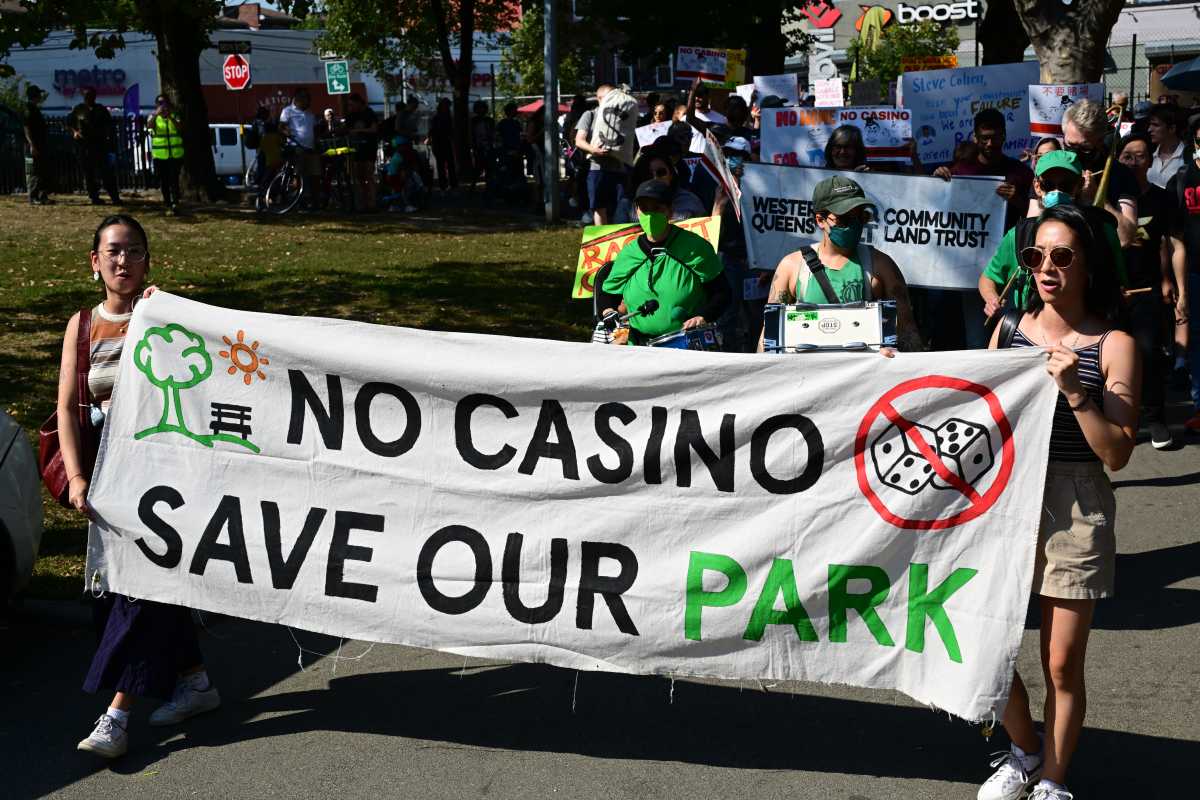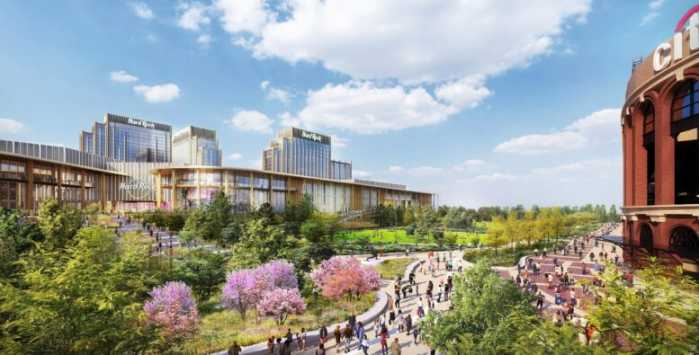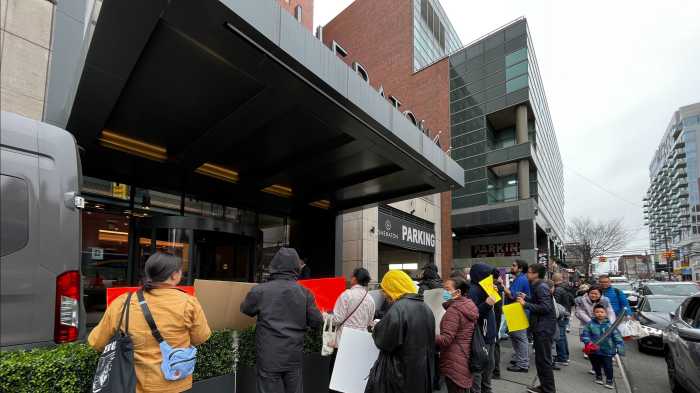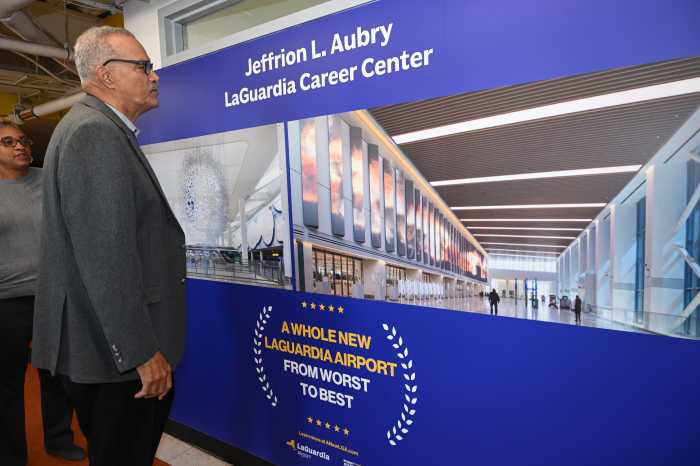More than 100 people joined a protest aimed at local elected officials Sunday afternoon after a Community Advisory Committee (CAC) unanimously voted in favor of the Metropolitan Park casino proposal last week.
Protesters gathered at Corona Plaza on Sunday, Oct. 5, holding signs such as “sold us out” and “casinos kill communities” to protest against the ambitious $8 billion proposal by Mets owner Steve Cohen and Hard Rock International.
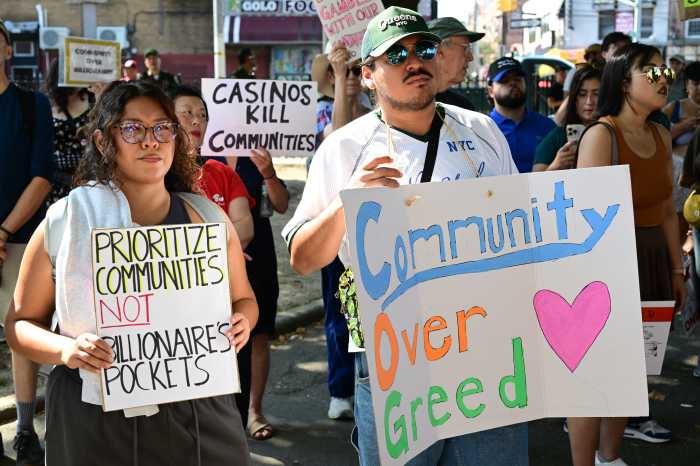
The project is one of four developments chasing three downstate gaming licences set to be awarded by the State Gaming Commission this December. If approved, it would transform 50 acres of Citi Field parking lot into a sprawling casino complex featuring a 25-acre public park, new shops and restaurants, a Taste of Queens food hall, and a full-scale redevelopment of the Mets-Willets Point subway station, along with improvements to roads and bike paths.
The Metropolitan Park proposal has gone through rigorous public oversight ever since Cohen and Hard Rock launched the proposal in November 2023.
Although the proposed development area is an asphalt parking lot, it was legally designated as city parkland, meaning the city needed to approve zoning text and city map amendments before the project could proceed. The state legislature also needed to approve parkland alienation legislation reclassifying the site as commercial property.
Both houses of the legislature, along with the City Council, voted overwhelmingly in favor of the necessary changes. All six relevant Community Boards also voted in favor of the project as the zoning text and city map amendments made their way through ULURP last year.
All projects vying for a downstate license also required approval from a CAC, with four of the eight projects rejects by their relevant CAC, including all three Manhattan-based proposals.
The Metropolitan Park CAC, however, voted unanimously in favor of the project, with Assembly Member Larinda Hooks, Queens Borough President Donovan Richards and Council Member Francisco Moya voting in favor. Lin Zeng, appointed on behalf of Mayor Eric Adams, George Dixon, appointed by State Sen. Jessica Ramos, and Gov. Kathy Hochul appointee Gregory Anderson also voted in favor of Metropolitan Park.
Vows to ‘keep fighting’
That unanimous vote sparked anger among some members of the local Flushing and Corona community, prompting Sunday’s protest at Corona Plaza.
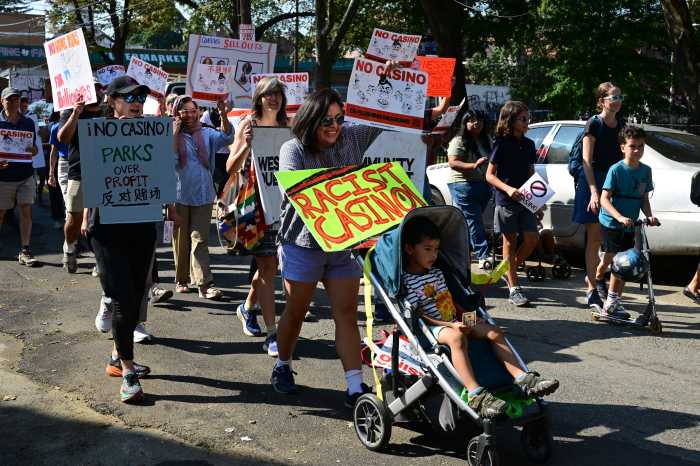
The protest, organized by members of the local community and supported by worker advocacy non-profit Flushing Workers Center, heard concerns from community members about the potential impacts that a casino would have on the area. Guardians of Flushing Bay, 89th Street Tenants Unidos, Western Queens Community Land Trust and Centro Corona also supported Sunday’s protest.
Protesters also vowed to “keep fighting” to prevent “public land” from being transferred into the hands of Cohen and Hard Rock.
One woman, who did not provide her name to QNS, alleged that the Metropolitan Park CAC “only wanted to hear from Cohen” and further alleged that no CAC members listened to members of the local community.
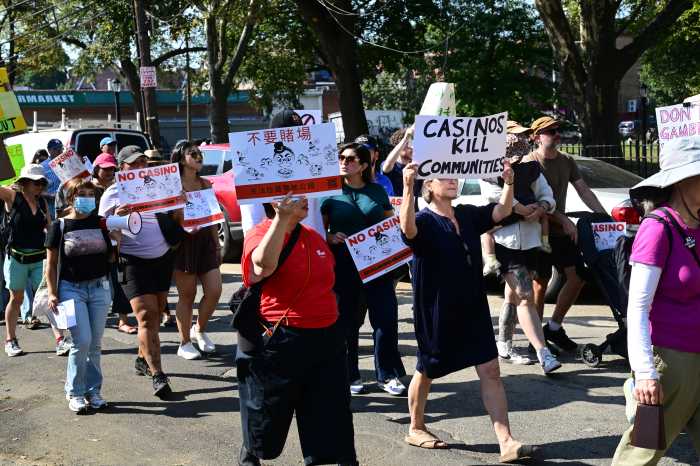
Protesters also accused the CAC of shutting down a hearing on Metropolitan Park to prevent opponents to the project from voicing their concerns.
A representative for Flushing Workers Center alleged that the CAC was “stifling” the voices of the local community by greenlighting the Metropolitan Park project.
One man at Sunday’s protest, who also did not provide his name, described the Metropolitan Park proposal as a “design for land without its people.”
He predicted that a casino would lead to the displacement of poor and working-class residents from the neighborhood and said the community “does not need” a casino.
“Steve Cohen and his cronies do not care about Corona or public life, our ways to make culture or the ways that we love and protect each other,” the protester said. “They do not care, and we should not believe their lies. We don’t need any of this, and we need to unite in open resistance and non collaboration with these forces.”
He added that local residents have previously been impacted by other “big flashy displacement projects” in the past.
“Cohen’s project is not an isolated moment,” he added.
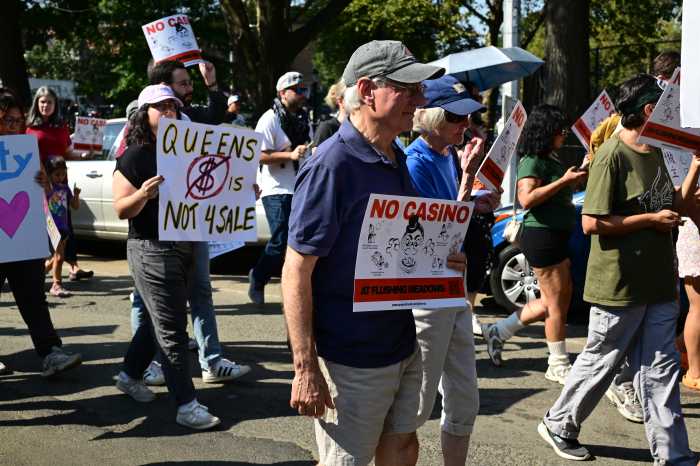
A ‘home run’ for Queens
Metropolitan Park spokesperson Karl Rickett pushed back against the protests, noting that the proposal has received support from six community boards as well as city and state officials.
“With approval by six out of six community boards, the City Council, the State Legislature and unanimous support from the Community Advisory Committee, it’s clear the community stands behind Metropolitan Park,” Rickett said in a statement.
Protesters, however, accused community boards of giving extra speaking time to supporters of the project and alleged that the process was “manipulated.”
Meanwhile, elected officials and community groups have touted the potential benefits of the Metropolitan Park proposal, pointing to 23,000 union jobs and $1 billion in community benefits.
Speaking after last week’s CAC vote, Richards said he had voted in favor of the project partially because of the “outreach and respect” that the Metropolitan Park team had shown the local community. He said such outreach set Metropolitan Park apart from previous failed projects such as Amazon’s shelved HQ2 project in Long Island City.
“They literally went to every corner of this earth to make sure that they spoke to everybody,” Richards said after Tuesday’s CAC vote. “I think what made this plan much different than a lot of larger economic development projects is they listened first. They didn’t come into queens and just shove a plan down our throat.”
Asked if he was concerned if the Metropolitan Park development would attract “problem gambling” to the community, Richards said the project will have a number of safeguards on-site, including addiction services. Still, Richards believes elected officials have a responsibility to continuously monitor concerns if the Metropolitan Park project comes to fruition.
“I think we have an obligation to make sure that we’re keeping our eyes and ears open,” he added.
Richards believes that many of the people who have raised opposition or concerns about the project will be the ones “taking advantage” of the thousands of union jobs that Metropolitan Park brings to Queens.
“This community was hit extremely hard during the pandemic,” Richards said. “We have an opportunity to now put 20,000 people and beyond to work.”
He described the vote as a “home run” for Queens, adding that the borough has “hit the jackpot” with the Metropolitan Park development.
Moya, on the other hand, said Metropolitan Park would be an “added benefit” for the local community and said the ongoing development of a new soccer-specific stadium at Willets Point would make the area a “destination.”
“We’re going to see job creation there,” Moya said. “It’s going to be a destination for people to come to, not just the sports, but also entertainment. And I think this is really great for the borough of Queens. I feel that this is really the step forward.”
Like Richards, Moya said he believed Metropolitan Park has succeeded where other projects have failed because it included grassroots support from members of the local community. He added that the majority of the opposition to Metropolitan Park has come from “outside the district” and insisted that he has an obligation to listen to the views of his constituents first.
Tom Grech, president and CEO of the Queens Chamber of Commerce, said the proposal would not only deliver 23,000 jobs to the area but also careers.
“It’s opportunities for people to get out of that notion of not having generational wealth and get into careers, benefits and opportunities for themselves and their family to really grow,” Grech said.
There is “no question” that Metropolitan Park, alongside Citi Field, the USTA and the new soccer stadium, would be a “big boon” for tourism in a part of Queens that is often neglected by international visitors, Grech added.

